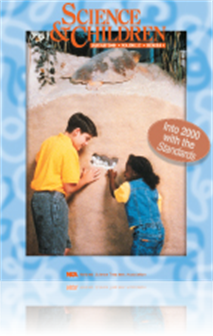All Resources
Journal Article
Recruiting and the Economic Status of the Science Teacher
Our schools are threatened by a drastic shortage of teachers. The facts about our teacher shortage are deeply disquieting and altogether convincing to thoughtful parents and discerning citizens. Many teachers are leaving our classrooms—over 600,000...
Journal Article
Project WET (Water Education for Teachers) is an international, broad-based water science and education program for formal and informal educators of students in grades K–12. It is part of a larger water resource education program called The Waterco...
Journal Article
Enquiry, the Science Teacher, and the Educator
What our teachers need to teach is determined, first, by the first that our national need is a dual one. There is an urgent pressing need for an increasing number of fluid enquirers and original engineers. There is also need for a voting and supporti...
Journal Article
The Galápagos Islands are sometimes thought of as the birthplace of evolution. Not because evolution begins there, not because evolution occurs there and nowhere else, but because the results of evolution so visible. A visit to these islands in 1835...
Journal Article
This article is one of a series that grew out of the question: Just what does educational research have to say to science teachers? In the case of the topic dealt with here, however—the effects of caring teachers on student learning—the question ...
Journal Article
Multicultural Science Education
There are many definitions of multicultural education. One of the most comprehensive definitions describes multicultural education as at least three things: an idea or concept, an educational reform movement, and a process. Multicultural education in...
Journal Article
Teachers who successfully use diverse learning modes in their instructional approaches accomplish several remarkable things. First, they create a climate where the ways of knowing central to the different modalities are all seen as legitimate, accept...
Journal Article
When an ethical issue is still being debated publically, it is inappropriate for schools to advocate a particular position—either explicitly or implicitly. Nevertheless, we can and should prepare students to integrate values and scientific knowledg...
Journal Article
It is the authors hope that the science education community will use the results of the Third International Mathematics and Science Study (TIMSS) to explore current issues in science education. Among these issues are the balance between breadth and d...
Journal Article
As teachers make the transition to inquiry-centered science, they discover a need for new assessments. In response to this need, a group of 125 elementary teachers embarked on a three-year investigation of science assessment. This project was a compo...
Journal Article
Charles W. Eliot’s Legacy to Science Education
Had Charles W. Eliot—a young Harvard graduate trained in chemistry—accepted an offer in 1865 to become a superintendent of the Merrimac Mills in Lowell, Massachusetts, the history science teaching in American high schools might have been very dif...
Journal Article
Last year the authors embarked on a study to find out whether more student-centered instruction was occurring in block-scheduled biology classes than in those of traditional duration and whether the student-centered strategies recommended by the Stan...




